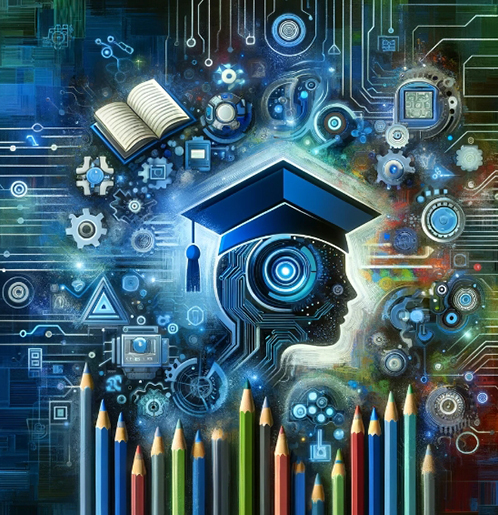What Is AI & EdTech?
AI & EdTech refers to the integration of artificial intelligence into education technology to enhance how students learn and how educators teach. It’s not just about putting tablets in classrooms or digitizing textbooks. AI-powered tools can adapt to student needs, automate administrative work, offer real-time insights, and support personalized learning at scale.
From intelligent tutoring systems to automated grading software and predictive analytics, artificial intelligence is shaping a new era of education—one that is data-driven, efficient, and student-centered. These technologies are not meant to replace educators but to support them, freeing up time for high-value interaction and enabling better learning outcomes.
Whether you're running a school, building an edtech product, working on policy, or attending a global education conference, understanding how technology in education is evolving is no longer optional. It’s essential.

Why This Theme Matters Now
The education sector is experiencing a major shift. The global adoption of AI-powered tools has moved from concept to classroom, and it’s happening fast. Schools and institutions are experimenting with adaptive learning systems, AI-driven assessment platforms, and even virtual teaching assistants.
There are three major reasons behind this shift, and each reveals why AI in education is more relevant than ever.
- First, the pandemic accelerated the digital transformation of learning. Schools needed scalable, tech-driven solutions. AI stepped in.
- Second, advancements in artificial intelligence have made it easier to implement personalized learning strategies that work. We’re now able to analyze student performance in real time and adjust instruction dynamically.
- Third, education is facing a resource crunch. Teachers are burned out, administrators are stretched thin, and student needs are increasingly complex. Technology in education offers scalable support, both in and out of the classroom.
This theme is about more than just innovation. It’s about relevance. How do we make learning more effective, accessible, and equitable with the help of artificial intelligence?
Resources To Explore Before Attending
To make the most of the AI & EdTech sessions at our education summit, here are a few books, talks, and tools that offer valuable context. You don’t need a tech background, just a willingness to explore.
Books
Below is a curated selection of insightful reads that will help you prepare for discussions, panels, and networking at the education conference. Each title offers unique perspectives on how AI and technology intersect with teaching and learning.
- “Deep Learning Revolution” — Terrence J. Sejnowski
This book examines how AI is impacting multiple domains, including education, by tracing the history and breakthroughs of deep learning. It offers insights into the technology’s transformative potential and its far-reaching implications for teaching, learning, and society at large. - “The AI Classroom” — Daniel Fitzpatrick, Amanda Fox, Brad Weinstein
A practical guide to using artificial intelligence tools in modern classrooms, filled with strategies, examples, and activities that educators can implement immediately. It highlights how AI can support creativity, personalization, and efficiency in education. - “How Humans Learn” — Joshua R. Eyler
An evidence-based look at the science of learning, drawing from psychology, neuroscience, and educational research. It provides practical advice on creating inclusive, student-centered classrooms that foster curiosity, critical thinking, and deeper engagement.
Watch & Listen
Explore a curated selection of talks and discussions that bring thought leaders, educators, and innovators together, much like what you might experience at our education summit. These resources provide valuable perspectives on creativity, AI integration, and policy shaping in education.
- Sir Ken Robinson’s TED Talk: “Do Schools Kill Creativity?”
A foundational conversation about rethinking learning systems and the urgent need to nurture divergent thinking in classrooms. Robinson challenges traditional schooling structures, urging educators to reimagine how talent and intelligence are recognized. - “AI And The Future Of Education” – Edsurge Podcast
A weekly podcast featuring individual episodes that explore how AI is transforming teaching and learning, covering everything from AI literacy in schools to ethical challenges and classroom innovation - UNESCO’s Webinar Series On AI In Education — Joshua R. Eyler
A global, policy-focused dialogue where experts discuss ethical guidelines, data privacy, and strategies for equitable AI deployment in schools. The series highlights diverse international case studies and emphasizes cross-border cooperation in shaping the future of education.
Try
Experiment with innovative tools ahead of our education conference to better understand how technology can enhance teaching, learning, and classroom management. These resources can help you engage students, streamline tasks, and explore new ways to deliver content.
- Read&Write by Texthelp
A literacy tool that supports diverse learners in accessing and understanding digital content. - QuillBot Or ScribeSense
Tools that generate quizzes and assess student responses using AI. - Otter.ai Or Notion AI
Tools that help educators summarize, transcribe, and plan more efficiently. - ChatGPT Or Claude
Use these tools to explore AI-assisted brainstorming or content generation for classroom
Frequently Asked Questions
Q1. I’m an educator, not a technologist. Will this theme be useful to me?
Yes. These sessions, part of our education conference, are designed for educators, school leaders, and edtech builders alike. The goal is to help you understand and apply AI in your context, no coding required.
Q2. Will the sessions of the Education 2.0 Conference focus on real-world applications?
Absolutely. At our education summit, we prioritize sessions built around case studies, product demos, and lived experiences, not just theory. You’ll gain insights you can directly apply to your teaching environment.
Q3. What if I’m concerned about data privacy and student safety?
That’s a key part of the conversation. We’ll cover how AI-powered tools collect data, what ethical considerations come into play, and how to implement safeguards.
Q4. Are students themselves using AI tools?
Yes, and in growing numbers. From homework help to content creation, students are already exploring these tools, whether teachers are ready or not. Understanding how they engage with artificial intelligence is a focus of our education conference, so educators can respond productively.
Q5. Is this theme beginner-friendly?
Very much so. Our education summit has created space for both newcomers and experts. Whether you’re experimenting for the first time or refining existing practices, you’ll find something valuable to enhance your approach.
Want To Share What You're Building? Step Up.
If you're building or implementing AI-powered tools in learning environments, we want to hear from you. Join us as a speaker or contributor to share how you’re improving access, engagement, or outcomes in education.
Get In Touch


